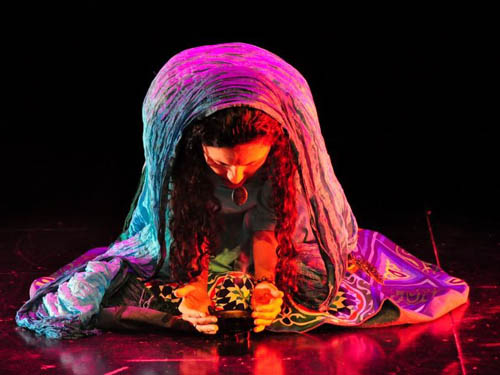The third annual Independent Theater Season kicked off last Thursday at Downtown’s Rawabet Theater with el-Ghagar troupe’s play Sho’oub Mosta’mala (Used Nations), a political satire examining a concocted contrast between Egyptian poverty and US imperialism.
Observing the exposed set before the show begins, viewers are likely to get a good idea of what they’re in for. Two tiers of a warship are outlined with roughly-cut plastic sheeting and framed with a coil of dotted red lights. The same sheeting wraps a makeshift podium and gurney downstage. The scenery is clearly the final outcome of what must have been a shoestring budget, and the audience is required to tap into its most generous of spirits if any suspension of disbelief is going to take place.
The play begins with a team of doctors rummaging through the entrails of a dead man on the gurney, collecting any remaining organs that may still be of use, as they bop and sing “throw the leftovers in the trash” to a dance beat. We then flash back to our dead hero’s home, and the first chapter of his story.
Destitute, his pregnant wife harangues him ceaselessly to bring home “used pampers and ‘cheated’ milk” to feed their spawn. He sets off to go begging, and–through some incomprehensible turn of events–ends up almost drowning at sea because of a shark bite. The “Rescue Team,” symbolizing the US military machine, saves him at the last minute before locking him up and dictating what’s best for him. Periodically, we’re provided with a political weather forecast, as his family’s search efforts eventually fail.
Using Friedrich Dürrenmatt’s short story “The Saved” as a departure point, director Azza el-Husseini–a professional actress who has worked on numerous high-profile TV series–spent eight years collaborating with Sayed el-Genary on the text before beginning formal rehearsals early this year.
“It was exciting to explore Dürrenmatt’s master-slave theme, especially as it relates to Egypt and the US,” says el-Husseini. “The idea of a captor masquerading as a savior seemed topical and relevant.”
Inspired colloquial witticisms pepper the dialogue, keeping the dark drama buoyant. Unfortunately though, a failure to push past obvious stereotypes and simplistic politics mean the end result is somewhat hackneyed and unremarkable.
Exciting as it is to behold the vigorous energy of the mostly youthful troupe, the overdone acting also does the play a disservice. Jokes are punched a little too forcefully, and the players hit soaring, abusive decibels as they try to make the most of their lines.
Mohamed Farouk’s interpretation of the protagonist–named “I” by the authors in an attempt to convey both an everyman quality and lamentation–repeatedly falls into the trap of victimization, needlessly soliciting pity for an already sympathetic character. Hamada Shousha however, dolled up in dyed-blond drag, shines as the insatiable Western temptress Lolita.
The character’s musical number evokes a golden age of political cabaret, and is quite possibly the only sequence in which the audience can mentally transport itself beyond its surroundings and fully immerse itself in the show’s quirky world.
“I worked with the actors to push the sarcasm as far as it will go,” says el-Husseini, who has managed to keep the show brief and lively. “It was important to find the right mocking tone to offset the heavier drama.”
The rib-tickling comedy is broad enough to vex the entire family, and the show insists on a zany festivity despite the dismal content. The shallow interpretation of the characters and their conflicts is unfortunate, however, and one can only wonder how powerful the play might have been had the actors dug deeper to tap into genuine pathos. Regrettably, the primary currency here in the exchange between player and audience is recycled sentiment.
With the smell of mildew reeking from under the floorboards, ancient dust wafting up your nostrils, and the neighboring car mechanics’ tools clanking away within earshot, you have to possess an irrational love of theatre to endure a poor show at Rawabet Theatre–which, sadly, currently happens to be the local independent theater scene’s sole venue. This is a play for those with an avid curiousity about, or deep-rooted commitment to supporting, local independent troupes. It’ll also work for those who wouldn’t mind killing an hour or so with some crude homespun entertainment.
Used Nations will be showing daily at 8.30 PM in Rawabet Theater until 22 April.
Admission price: LE5

